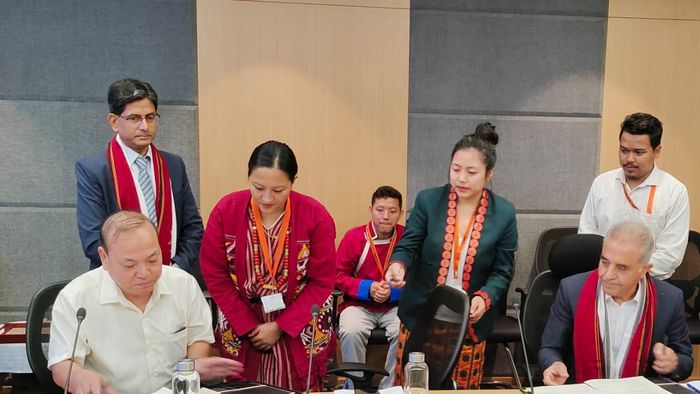Arunachal joins hands with Norwegian institute to explore geothermal potential
The MoU signing ceremony, which took place in the presence of Chief Minister Pema Khandu, marked a momentous occasion for the state.

- Sep 27, 2023,
- Updated Sep 27, 2023, 3:59 PM IST
The Arunachal Pradesh Government has taken a significant step towards harnessing the state's vast geothermal potential by signing a Memorandum of Understanding (MoU) with the Norwegian Geotechnical Institute (NGI). This collaboration aims to explore the feasibility of tapping into the abundant geothermal resources offered by the state's numerous hot springs.
The MoU signing ceremony, which took place in the presence of Chief Minister Pema Khandu, marked a momentous occasion for the state. Repo Ronya, Secretary, Science and Technology, Government of Arunachal Pradesh, and Dr. Rajinder Bhasin, Technical Expert from NGI, Norway, signed the agreement. The event also witnessed the participation of Science and Technology Minister Honchun Ngandam, Chief Secretary Dharmendra, and Dr. Vivek Kumar, Senior Advisor from the Norwegian Embassy, New Delhi.
Chief Minister Pema Khandu congratulated NGI and the Department of Science and Technology for taking this vital step towards green and clean energy production, especially in light of global concerns about climate change. He pointed out the significance of the MoU being signed on World Tourism Day, whose theme this year is 'Tourism & Green Investment,' aligning perfectly with this new initiative.
Khandu expressed optimism that the study resulting from this collaboration will lead to the development of renewable geothermal sources in Arunachal Pradesh, helping to meet both present and future energy demands. He highlighted the potential for replacing generators that currently run on fossil fuels in mountainous areas with geothermal energy, a move that would reduce CO2 emissions.
Acknowledging that this technology is new to the state, Khandu expressed confidence that NGI, with its expertise and prior success in implementing a project in Ladakh, will revolutionize energy production in Arunachal Pradesh. This transformation will benefit not only the local population living in high-altitude regions but also the army personnel stationed there.
Furthermore, Chief Minister Khandu expressed hope that the collaboration with NGI would extend beyond harnessing geothermal resources. He proposed cooperation in road construction and tunneling, citing the need for a tailored technology due to Arunachal Pradesh's unique geographical and geological characteristics. Norway, with similar geological features, boasts world-class road infrastructure and tunnels that could offer valuable insights.
Dr. Rajinder Bhasin, Technical Expert from NGI, echoed Khandu's sentiments, emphasizing that Norway's extensive tunnel network significantly shortens road distances, thereby enhancing government revenue. He praised Arunachal Pradesh's tourism potential and breathtaking landscapes, expressing his admiration for the state's natural beauty.
Representing the Norwegian Embassy, Senior Advisor Dr. Vivek Kumar affirmed the Embassy's readiness to facilitate cooperation between Norwegian agencies, experts, and the state government across various sectors.
The collaborative project is receiving technical support from the Royal Norwegian Embassy through NGI. The Centre for Earth Sciences & Himalayan Studies, an autonomous organization of the Department of Science & Technology, Government of Arunachal Pradesh, has been engaged in discussions with NGI to perform feasibility studies for harnessing geothermal resources in the state.
The MoU's primary objective is to create a framework for both parties to work together on mutually agreed-upon activities, focusing on further developments in the field of Geotechnics and Rock Engineering. The collaboration will address complex sub-surface geological and geotechnical challenges faced by the state.
To initiate this venture, NGI will conduct geological, geochemical, and geothermal investigations at selected geothermal sites in Tawang and West Kameng districts. This process will include MT Surveys to assess the deeper geoelectrical configuration of geothermal springs (hot springs) and evaluate the feasibility of utilizing geothermal energy resources for various purposes.